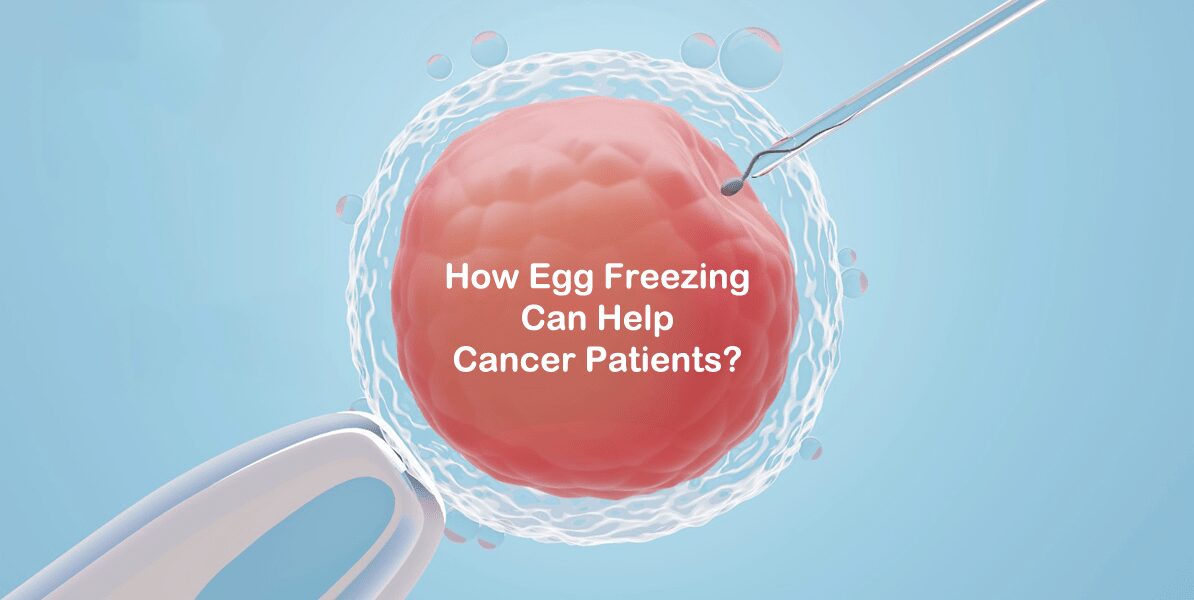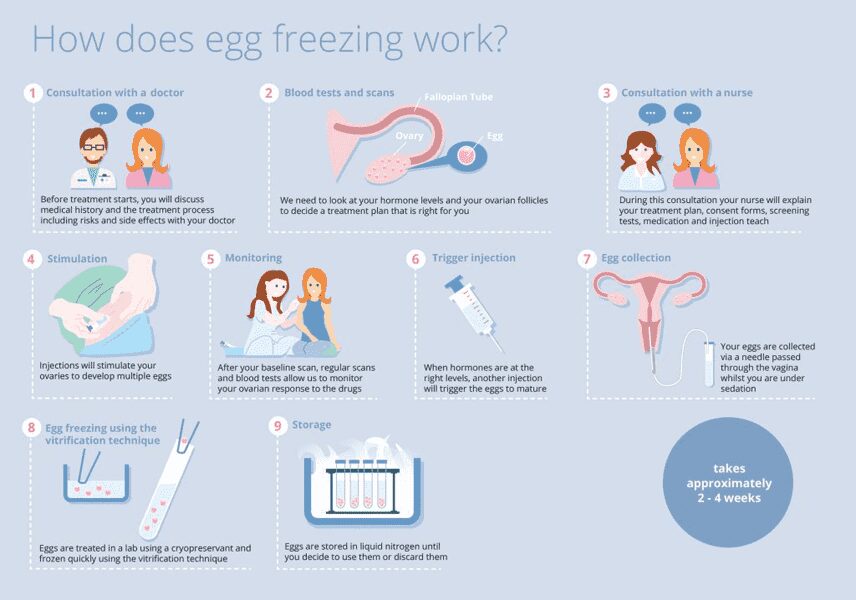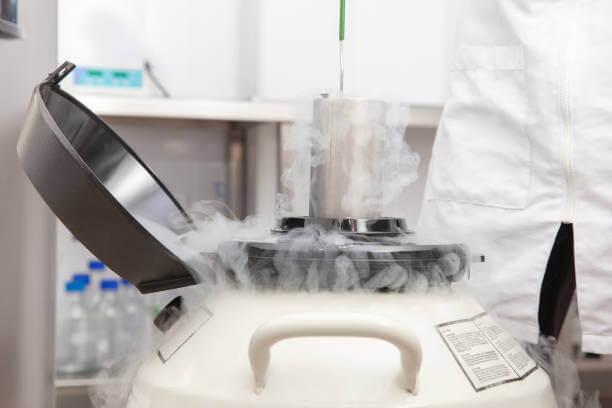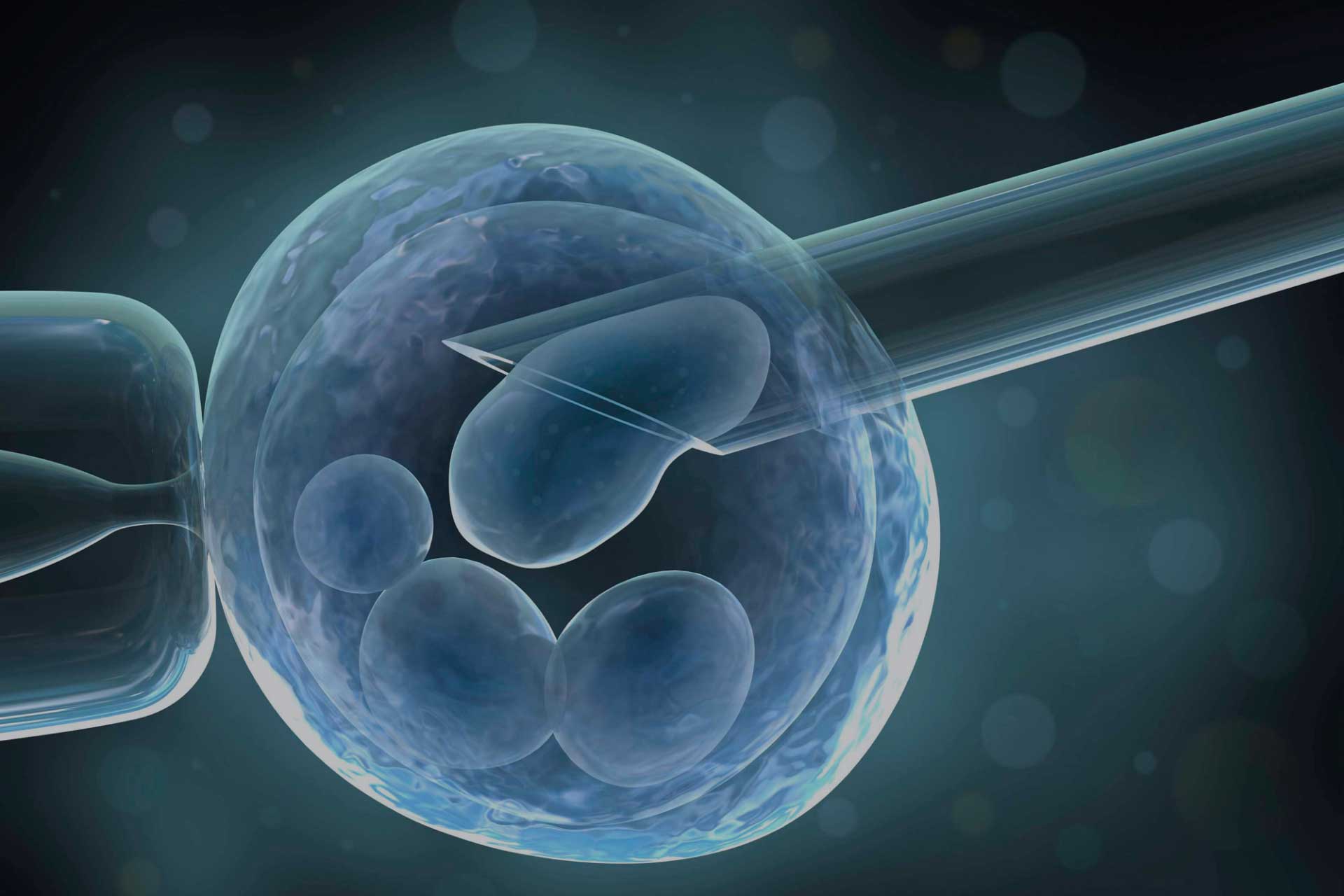How Egg Freezing Can Help Cancer Patients: Preserving Fertility in the Face of Adversity


A cancer diagnosis can be life-altering, bringing numerous challenges and difficult decisions. For many women of reproductive age, one significant concern is the potential impact of cancer treatments on their fertility. Fortunately, advancements in reproductive medicine have made egg freezing a viable option for preserving fertility.
This comprehensive guide explores how egg freezing can help cancer patients maintain their dream of building a family in the future.
Understanding Egg Freezing for Cancer Patients
Egg freezing, also known as oocyte cryopreservation, is a process where a woman’s eggs are harvested, frozen, and stored for future use. For cancer patients, this procedure offers hope and the possibility of having biological children after completing cancer treatment.
Key Benefits of Egg Freezing for Cancer Patients:
- Preserve fertility before potentially damaging treatments
- Provides emotional reassurance during a challenging time
- Offers flexibility in family planning post-recovery
- Increases chances of having biological children in the future
The Impact of Cancer Treatments on Fertility
Many cancer treatments can negatively affect a woman’s reproductive system. Understanding these effects is crucial for making informed decisions about fertility preservation.
|
Treatment Type |
Potential Impact on Fertility |
|
Chemotherapy |
Can damage or destroy eggs in the ovaries |
|
Radiation Therapy |
May cause damage to ovaries or uterus |
|
Surgery |
Removal of reproductive organs may be necessary |
|
Hormonal Therapy |
Can disrupt normal ovarian function |
Get in touch for FREE SURROGACY CONSULTING:
Mobile: +91-8800481100 ( WhatsApp, Line, Viber)
Email: neelam@ivfconceptions.com
Why Consider Egg Freezing?
Cancer treatment can often include chemotherapy, radiation, or surgery, which may have detrimental effects on fertility. These treatments can damage eggs and ovarian tissue, potentially resulting in infertility or early menopause. By freezing your eggs before undergoing cancer treatment, you can safeguard your ability to have biological children later on.
The Egg Freezing Process for Cancer Patients- In Nutshells
The egg-freezing process for cancer patients is similar to that for non-cancer patients but may be expedited to avoid delaying cancer treatment.
Steps in the Egg Freezing Process:
- Consultation and Testing: Meet with a fertility specialist to discuss options and undergo hormonal and ovarian reserve testing.
- Ovarian Stimulation: Hormone injections stimulate the ovaries to produce multiple eggs.
- Monitoring: Regular blood tests and ultrasounds track egg development.
- Egg Retrieval: A minimally invasive procedure to collect mature eggs.
- Freezing: Retrieved eggs are frozen using vitrification, a rapid freezing technique.
- Storage: Eggs are stored in liquid nitrogen until needed.
Timing Considerations for Cancer Patients
Time is often a critical factor for cancer patients considering egg freezing. Coordination between oncology and fertility teams is essential to ensure that fertility preservation doesn’t significantly delay cancer treatment.
Factors Influencing Timing:
- Type and stage of cancer
- Urgency of cancer treatment
- Patient’s current health status
- Ovarian reserve and age of the patient
Success Rates and Considerations
While egg freezing offers hope, it’s important to understand the success rates and factors that can influence outcomes.
Factors Affecting Success:
- Age at the time of freezing
- Number of eggs frozen
- Quality of eggs
- Advancements in freezing and thawing techniques
According to recent studies, the live birth rate per thawed oocyte for women under 35 is approximately 5-7%. However, these rates can vary based on individual circumstances.
Financial Aspects of Egg Freezing for Cancer Patients
The cost of egg freezing can be a concern for many cancer patients. However, there are options available to help manage these expenses.
Potential Costs of egg freezing:
- Medication for ovarian stimulation
- Egg retrieval procedure
- Freezing and storage fees
- Future IVF cycles when ready to use the eggs
Financial Assistance Options for egg freezing:
- Insurance coverage (check your policy for fertility preservation benefits)
- Fertility preservation grants for cancer patients
- Discounted rates offered by some clinics for cancer patients
- Financing options or payment plans
Emotional and Psychological Considerations
The decision to freeze eggs while dealing with a cancer diagnosis can be emotionally challenging. It’s important to address the psychological aspects of this process.
Common Emotional Experiences:
- Anxiety about future fertility
- Hope for life after cancer
- Stress about making quick decisions
- Concerns about delaying cancer treatment
Many fertility clinics offer counseling services or can refer patients to support groups specifically for cancer patients dealing with fertility issues.
Legal and Ethical Considerations
Egg freezing for cancer patients involves several legal and ethical considerations that should be addressed.
Key Points to Consider:
- Consent forms for egg freezing and storage
- Decisions about the disposition of eggs in various scenarios
- Age limits for using frozen eggs (set by clinics or local regulations)
- Ethical discussions about the posthumous use of eggs
Dealing with a cancer diagnosis can be overwhelming, especially for women who dream of starting a family one day. However, thanks to technological advancements in medicine, there is a glimmer of hope for those facing cancer treatments.
Egg freezing, also known as oocyte cryopreservation, offers the possibility for women to preserve their fertility before undergoing cancer treatments. This guide will walk you through how egg freezing can help cancer patients and provide you with the necessary steps to consider.
Egg Freezing for Cancer Patients- Stepwise Process Guide


If you have recently been diagnosed with cancer and are concerned about preserving your ability to have children in the future, egg freezing may offer a solution. Egg freezing, also known as oocyte cryopreservation, is a process where a woman’s eggs are harvested and stored for later use.
Step 1: Consultation with a Fertility Specialist
- Start by scheduling a consultation with a fertility specialist who has experience in fertility preservation for cancer patients.
- During the consultation, discuss your cancer treatment plan and how it may impact your fertility.
- The fertility specialist will explain the egg-freezing process, including the risks, success rates, and costs involved.
- It is essential to ask any questions you might have during this consultation to ensure you have a clear understanding of the procedure.
Step 2: Ovarian Stimulation
- Once you decide to proceed with egg freezing, you will need to undergo ovarian stimulation.
- This involves taking hormonal medications to stimulate your ovaries and produce multiple mature eggs.
- The fertility specialist will closely monitor your progress through ultrasounds and blood tests to ensure optimal egg development.
- It normally takes around 10-14 days to complete the ovarian stimulation phase.
Step 3: Egg Retrieval
- When your eggs have reached the desired maturity level, the fertility specialist will schedule an egg retrieval procedure.
- The procedure is typically performed under sedation or light anesthesia to ensure you are comfortable and pain-free.
- A needle is inserted into each ovary using ultrasound guidance to collect the eggs.
- The collected eggs are then taken to the laboratory for freezing.
Step 4: Egg Freezing and Storage
- In the laboratory, the eggs are carefully frozen using a process called vitrification, which ensures their preservation.
- Once frozen, the eggs can be stored for an extended period without any significant damage.
- They are typically stored in special containers with liquid nitrogen at very low temperatures.
- The eggs can be stored for several years, allowing you to focus on your cancer treatments without the worry of a decline in fertility.


Step 5: Future Use
- After you have completed your cancer treatments, you can decide when and if you want to use the frozen eggs.
- The thawed eggs are then fertilized with sperm through a procedure called intracytoplasmic sperm injection (ICSI) to create embryos.
- Women can then undergo an embryo transfer to establish a pregnancy at a time that is most suitable for them.
- It is crucial to consult with your fertility specialist to discuss the success rates, options, and potential risks associated with using frozen eggs.
Step 6: Cancer Treatment
After your eggs are successfully frozen, you can proceed with your cancer treatment. Focus on prioritizing your health and well-being during this time, knowing that you have taken steps to preserve your fertility for the future.
Step 7: Post-Cancer Planning
Once your cancer treatment is complete, it’s essential to consult your fertility specialist to discuss your options. They will guide you through the process of thawing and fertilizing the frozen eggs when you are ready to start a family. This may involve in vitro fertilization (IVF) or intracytoplasmic sperm injection (ICSI), depending on your specific circumstances. If you are a married couple or already have a partner, it is better to create embryos after egg pick up as it is easy to manage the frozen embryos, and also the success rate is better as the fertilization rate is higher with fresh eggs.
Additional guides for surrogacy in the USA:
What is Egg Freezing: A Comprehensive Guide
All about Egg Freezing: Types, Cost, Process, Risk, And Who Needs It.
Conclusion
Egg freezing offers cancer patients an opportunity to preserve their fertility and enhance their chances of conceiving in the future. By taking proactive steps before cancer treatments, you can greatly increase the likelihood of achieving your dream of becoming a parent. Consultation with a fertility specialist, ovarian stimulation, egg retrieval, freezing, and future use are key steps in this process. Remember, taking control of your fertility can provide hope and comfort during a challenging time in your life.
Remember that while egg freezing increases your chances of preserving your fertility, it is no guarantee of future pregnancy. It’s important to have realistic expectations and be aware that success rates vary based on several factors, including age and overall health.
If you’d like to learn more about IVF, Egg Donation, or surrogacy Consulting services globally, check out the rest of our website at IVF Conceptions. We offer legally secure and affordable surrogacy consulting services for FREE.
Our team has over 14 years of experience facilitating surrogacy arrangements, egg donation, and serving as an advocacy resource for infertile couples and LGBTQ individuals seeking to build families. Till now we have helped and supported thousands of the intended parents with their family-building journey, and we can help you as well. Happy to share the references from the past IPs if needed.
Contact us:
Mobile: +91-8800481100 ( WhatsApp, Line, Viber)
Email: neelam@ivfconceptions.com
Web: www.completesurrogacy.com

 Frequently Asked Questions (FAQs)
Frequently Asked Questions (FAQs)
To address common concerns and provide quick answers, here’s a list of frequently asked questions about egg freezing for cancer patients:
1. Is egg freezing safe for cancer patients? Generally, yes. The process is considered safe for most cancer patients, but it’s important to consult with both your oncologist and a fertility specialist to ensure it’s appropriate for your specific situation.
2. How long does the egg freezing process take? The entire process typically takes about 2-3 weeks from the start of ovarian stimulation to egg retrieval. However, for cancer patients, this timeline may be compressed to avoid delaying cancer treatment.
3. Will egg freezing delay my cancer treatment? In most cases, egg freezing can be completed with minimal delay to cancer treatment. Your medical team will work to coordinate the timing to ensure your cancer care remains the priority.
4. What types of cancer treatments affect fertility? Chemotherapy, radiation therapy (especially to the pelvic area), and certain surgeries can all potentially impact fertility. The extent of the impact depends on factors like the type and dose of treatment.
5. At what age should I consider egg freezing? Egg freezing can be done at any age after puberty and before menopause. However, the quality and quantity of eggs decrease with age, so freezing at a younger age typically yields better results.
6. How many eggs should I freeze? The ideal number varies, but most fertility specialists recommend freezing 15-20 mature eggs for a good chance at a future pregnancy. This may require more than one cycle of egg retrieval.
7. What are the success rates of using frozen eggs? Success rates vary based on factors like age at freezing and the number of eggs frozen. Generally, the live birth rate per thawed oocyte is about 5-7% for women under 35.
8. How long can eggs remain frozen? Eggs can remain frozen indefinitely. There have been successful pregnancies from eggs frozen for over a decade.
9. Will my insurance cover egg freezing? Coverage varies widely. Some insurance plans cover fertility preservation for medical reasons like cancer. Check with your insurance provider and ask about specific coverage for fertility preservation related to cancer treatment.
10. Are there any side effects from the egg freezing process? Most women experience mild side effects from the hormone injections, such as bloating, mood swings, and breast tenderness. Serious complications are rare but should be discussed with your doctor.
11. Can I freeze my eggs if I’ve already started cancer treatment? It depends on the type and duration of treatment you’ve undergone. In some cases, it may still be possible to freeze eggs, but it’s best to consult with a fertility specialist as soon as possible after diagnosis.
12. What happens if I decide not to use my frozen eggs in the future? You have several options: you can continue to store them, donate them to research or to another individual, or have them discarded. These options should be discussed and documented during the initial consent process.
13. Is egg freezing the only fertility preservation option for cancer patients? No, other options may include embryo freezing (if you have a partner or are open to using donor sperm), ovarian tissue freezing, or medications to suppress ovarian function during chemotherapy. The best option depends on your individual circumstances.
14. How do I find a fertility clinic experienced in working with cancer patients? Ask your oncologist for referrals, or check with organizations like the Alliance for Fertility Preservation or the Oncofertility Consortium for lists of specialized clinics.
15. What psychological support is available during this process? Many fertility clinics offer counseling services or can refer you to support groups specifically for cancer patients dealing with fertility issues. Don’t hesitate to ask for this support, as it can be an emotionally challenging process.
